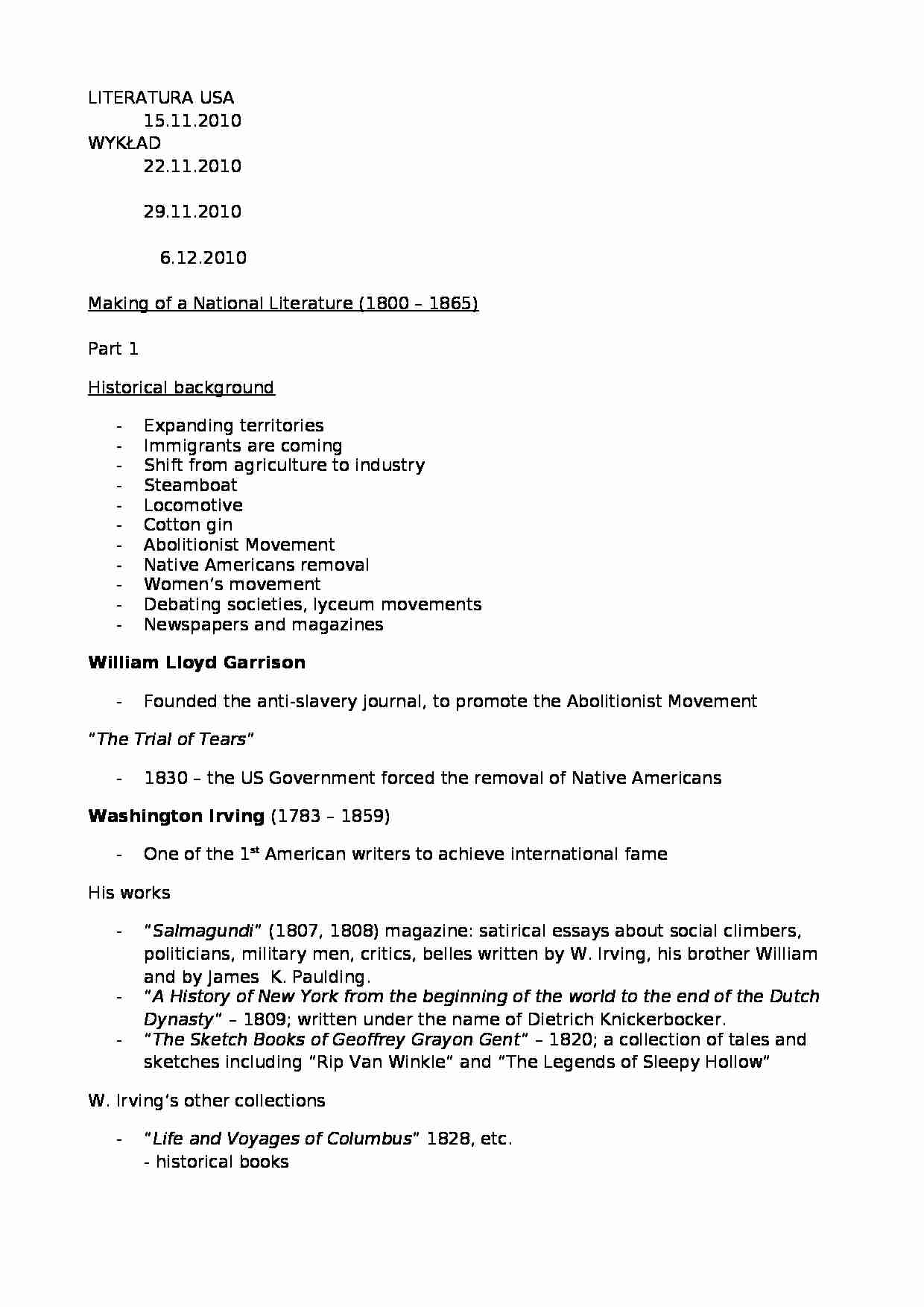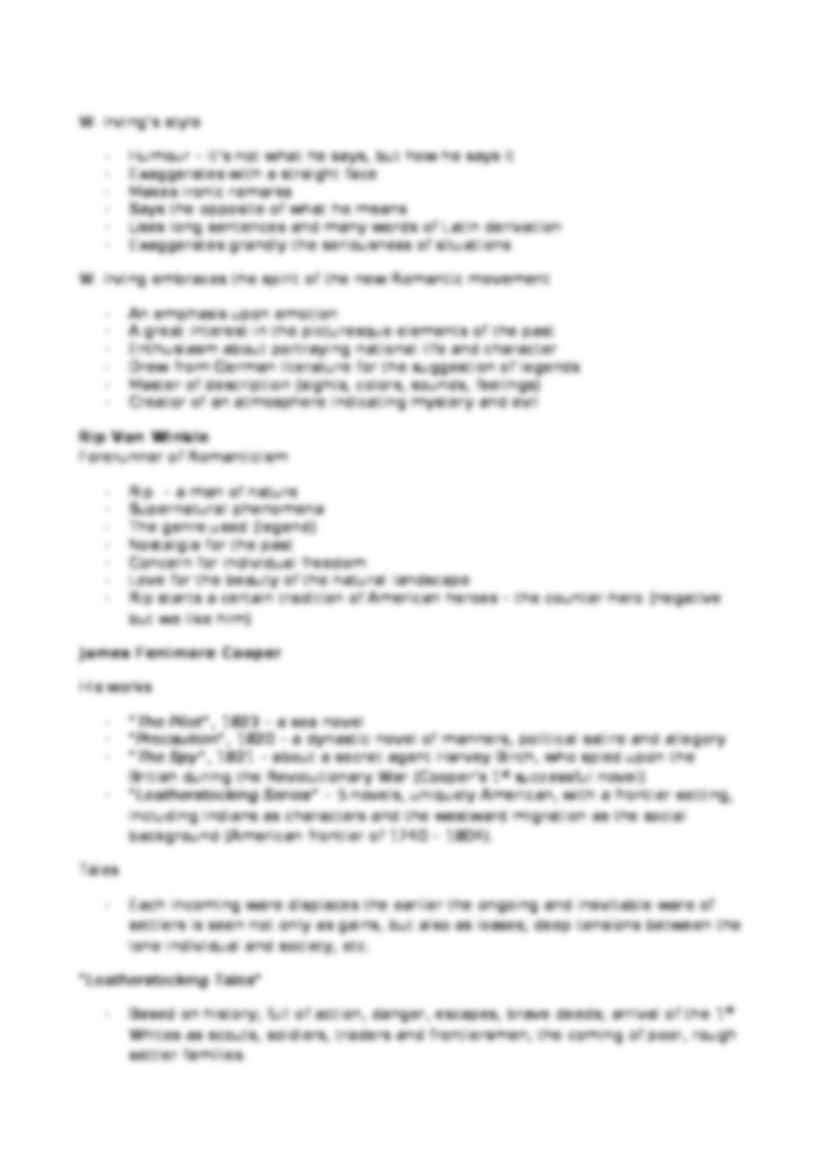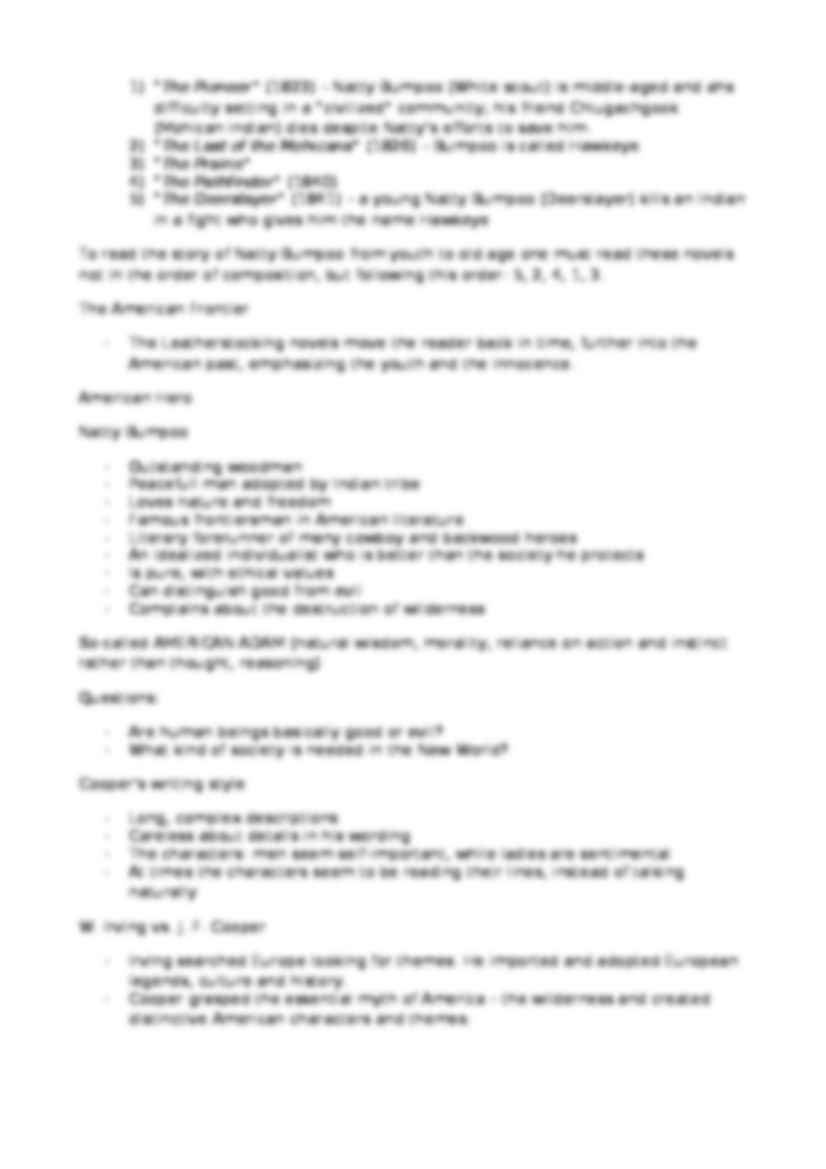To tylko jedna z 9 stron tej notatki. Zaloguj się aby zobaczyć ten dokument.
Zobacz
całą notatkę



LITERATURA USA 15.11.2010 WYKŁAD 22.11.2010 29.11.2010 6.12.2010 Making of a National Literature (1800 - 1865) Part 1
Historical background
Expanding territories
Immigrants are coming
Shift from agriculture to industry
Steamboat
Locomotive
Cotton gin
Abolitionist Movement
Native Americans removal
Women's movement
Debating societies, lyceum movements
Newspapers and magazines
William Lloyd Garrison
Founded the anti-slavery journal, to promote the Abolitionist Movement
“The Trial of Tears”
1830 - the US Government forced the removal of Native Americans
Washington Irving (1783 - 1859)
One of the 1st American writers to achieve international fame
His works
“Salmagundi” (1807, 1808) magazine: satirical essays about social climbers, politicians, military men, critics, belles written by W. Irving, his brother William and by James K. Paulding.
“A History of New York from the beginning of the world to the end of the Dutch Dynasty” - 1809; written under the name of Dietrich Knickerbocker.
“The Sketch Books of Geoffrey Grayon Gent” - 1820; a collection of tales and sketches including “Rip Van Winkle” and “The Legends of Sleepy Hollow”
W. Irving's other collections “Life and Voyages of Columbus” 1828, etc. - historical books
W. Irving's style
Humour - it's not what he says, but how he says it
Exaggerates with a straight face
Makes ironic remarks
Says the opposite of what he means
Uses long sentences and many words of Latin derivation
Exaggerates grandly the seriousness of situations
W. Irving embraces the spirit of the new Romantic movement
An emphasis upon emotion
A great interest in the picturesque elements of the past Enthusiasm about portraying national life and character
Drew from German literature for the suggestion of legends
Master of description (sights, colors, sounds, feelings)
Creator of an atmosphere indicating mystery and evil
Rip Van Winkle Forerunner of Romanticism
Rip - a man of nature
Supernatural phenomena
The genre used (legend)
(…)
… civilization, revelation of God to the individual)
Idealizing the “noble savage” - on individual not spoiled by luxury and sophistication
Stress on emotion rather than reason
Subjectivity in form and meaning
Edgar Allan Poe (1809 - 1849)
Poe's mother -> a talented English actress, Elizabeth Arnold
Poe's father -> a much less talented American (Irish) actor, David Poe. He was an alcoholic who deserted his wife…
…
Obsession with morality
Sexual pepresion
Guilt and confession
Spiritual salvation
Conflict -> life inside and social domain
Constrictions and repression
Law and freedom
Condition of a woman in a society (separation and subjection)
Symbols (an object assumes multiple possible significances)
Hester -> love, Arthur -> spirit, Chillingworth -> mind
His other works
“The House of 7 Gables”
“Fanshawe” (1828…
… ship Acushnet - a trip to the South Pacific to hunt whales
Dedicated his greatest book “Moby Dick” to Nathaniel Hawthorne
Melville admired Hawthorne's work
Wrote an article “Hawthorne's and His Mosses”, citing it's power of blackness
“Moby Dick, or the Whale”
Begins with a character directly addressing the reader
“Call me Ishmael”. He feels it is high time to go to sea
The sip is full of fascinating…
… and society, etc.
“Leatherstocking Tales”
Based on history; full of action, danger, escapes, brave deeds; arrival of the 1st Whites as scouts, soldiers, traders and frontiersmen; the coming of poor, rough settler families.
“The Pioneer” (1823) - Natty Bumpoo (White scout) is middle-aged and ahs difficulty setting in a “civilized” community; his friend Chiugachgook (Mohican Indian) dies despite…
… psychothrillers)
Poe invented the detective story - the “ratiocinative” tale. The devices used in it.
A brilliant detective
The device o the “baffled friend” - the detective's companion is not good at solutions, the detective tells him the story
At the ends - the detective dissolves his surprising solution and “elucidates” step by step the reasoning that led to it
By eliminating all the impossibilities, you…
…
“monkey rope bonds” - Ishmael holding the rope which is tied to him, Queequeg the harpooner is going down - the sense of connectedness
“fast fish” - it's your fish if you caught it (people controlling others)
“loose fish” - a fair game for anyone who can catch it first (e.g. Poland to Czar)
“The Whiteness of the Whale”
History suggest that white colour is purity: in contrast Melville examines the horror…
... zobacz całą notatkę






Komentarze użytkowników (0)